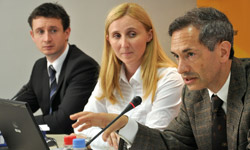In the framework of the Inclusion of children with developmental disabilities, including Roma children programme, funded by the EU and carried out by the FAMILIA Association, another cycle regarding the training of representatives from interdepartmental committees involved in social security was completed, and the publication CHILDREN WITH DISABILITIES – recommendations for evaluation and support was issued.
„This project was about one of the most vulnerable groups a society might have: children living with disabilities and Roma children. It is obvious that these children would face unequal chances and limited opportunities in life, largely due to social exclusion, if they did not get any external help. Social inclusion, one of the basic principles of the European Union, enables vulnerable groups, including people living with disabilities, to be included in every segment of social life,” said Yolanda San Jose, Head of Operations within the EU Delegation to Serbia, addressing the participants in the Conference held on the occasion of completion of the training cycle and promotion of the CHILDREN WITH DISABILITIES – recommendations for evaluation and support publication.
EU has funded 94%, or €47,800, of project expenses.
„Spending on the improvement of the situation of children from vulnerable environments is our duty. Moreover, any fund given to children should be perceived as investment in the future of the whole of the society. It will contribute to a better, more human environment for all, free of discrimination, exclusion and poverty,” said San Jose.
As of 2010, 300 social security professionals were trained for the implementation of a standardised tool aimed at assessing needs of children with disabilities and their families, called ROD (Serbian abbreviation for Parent-Environment-Child). Among those trained, there are representatives from every interdepartmental committee, foster care advisors from four out of five foster care and adoption centres, professional associates of centres for social work, as well as representatives from children with disabilities day care centres and organisations.
Almost every centre for social work in Serbia employs at least one professional associate that is licensed to use the ROD methodology which was developed by FAMILIA Association in cooperation with the UNICEF and Ministry of Labour, Employment and Social Policy. It is envisaged that the assessment tool improves social security practices in Serbia.
Children with disabilities, including children with social-emotional development problems, as well as children from the marginalised social groups, such as Roma children, require support at every stage of development and involvement in both education system, and the community as a whole.
First step in this process is assessment of their needs, upon which the support will be outlined and provided. ROD methodology was created with the aim of standardising the assessment of children’s needs (regardless of the type of the family they live in: biological, foster or adoptive family type) by centres for social work, but over time, interdepartmental committees and other social security service providers engaged in the process.




